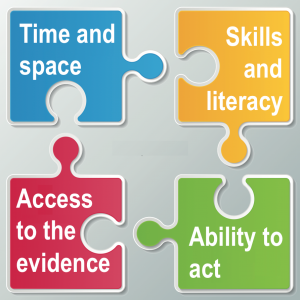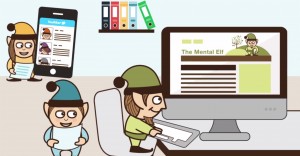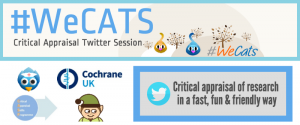
I’ve been asked to speak at a conference in Manchester tomorrow, so I’ve decided to share some of my presentation and crowdsource a bit of feedback from you lovely Mental Elf readers.
The topic I’ve been asked to talk about is ‘New ways to engage with research evidence’. I’m really looking forward to hearing Mark Brown talk about ‘New ways of using digital technologies to deliver mental health support’, and also meeting up with and listening to Prof Karina Lovell, Dr Geraldine Strathdee and Prof Shôn Lewis. The conference is aimed at mental health nurses and researchers.
Evidence-Based Practice: why aren’t we doing it?
My plan is to begin by setting the scene and highlighting some of the barriers to being evidence-based practitioners. It’s 20 years since evidence-based medicine (EBM) first hit our shores (Sackett et al, 1996) and in that time we have seen this approach to practicing medicine move from a position of heresy to one of absolute orthodoxy. So how come we’re not all doing it?
A decade ago I was struck (in the billiard room) by Dr Glasziou with an Evidence Pipeline. I’ve never felt quite right since. It’s a simple idea, that there are seven stages along which evidence needs to travel, in order to reach patients. Even with good (i.e. 80%) adherence at each stage, the chances of evidence reaching practice is only about 21%.

Glasziou and Haynes show how leaks along the evidence pipeline prevent research getting into practice.
Our own recent White Paper has highlighted the avalanche of reliable research that buries all of us working in mental health every day (Badenoch et al, 2015). Clearly, finding relevant and reliable evidence remains a huge challenge, but just as important are lack of time, the motivation to engage with research, skills to appraise and understand evidence, and the wherewithal to use research in practice. This evidence-based practice malarkey is hard!
The conclusions of our White Paper were:
- The currency of our knowledge degrades over time
- Research is inaccessible to the majority who don’t have the skills to appraise it or use it in practice
- It’s impossible to keep up to date with the quantity of research now being produced
- We need accessible, usable and reliable summaries of new evidence
- Blogs and social media can help us find, use and discuss relevant evidence
You won’t be surprised to hear me extolling the virtues of blogging and tweeting as a great way to learn about new evidence, but it doesn’t end there.
Six top tips for engaging with research evidence
1. Get motivated
I don’t have time for all that academic medicine stuff
– Anonymous GPI love these elf blogs. I would read this in the car park before work
– Anonymous School Nurse
Engaging with evidence has to start with the right attitude and the right environment. It takes time and dedication to read, understand and use research in practice, and for many this is on top of a busy and stressful day job caring for patients. We need access to the best available evidence and paywalls still get in the way for many of us. We also need critical appraisal skills and many of us were never taught how to read a paper and fathom its strengths and weaknesses.
It’s challenging but ultimately extremely rewarding. My advice would be to get motivated and jump in by reading some blogs and reading/writing some tweets before you move on to the full text papers!

The recipe for evidence-based practice.
2. Be sociable
Being sociable online opens up so many new avenues of thought and adventure. You can build relationships, create networks and develop new skills so much easier if you are gregarious and accept the support of your peers. Of course it’s vital that you don’t restrict this sociability to people like you, who agree with your world view, read the same newspaper, vote for the same party etc. Filter bubbles should be avoided at all cost if you want to learn and grow. Communicating outside of you own bubble can be hard work, but as anyone involved in public engagement with research activities will tell you, it’s often the most enriching part of doing research.
Social media, especially Twitter, is such an easy place to strike up friendships and engage in conversation with people about health, wellbeing and research. It’s also an increasingly vital way of side-stepping the traditional news media and getting a more balanced view of what’s going on.
Check out the awesome WeCommunities Twitterversity resources if you want some help getting started.

Behave on Twitter like your average dog behaves with his doggy friends in the park, you’ll not go far wrong (minus the bum sniffing, obviously).
3. Read critically
Our soundbite culture hates uncertainty, which makes it all the more important that we learn to acknowledge and express uncertainty ourselves. I’m a lifelong fan of the Critical Appraisal Skills Programme (CASP) and one of the things I learnt early on at their workshops was that it’s OK to say “I don’t know” or “this evidence doesn’t provide us with a complete answer”. That’s something that many of us struggle with, e.g. standing up in front of our peers and saying that we don’t understand the statistics in the paper we’re all reading.
So start by recognising the gaps in your knowledge and then learn how to read research papers critically – the CASP checklists are a great place to begin. If you tackle it step by step, you’ll be surprised how far you come. The good news is that we’re offering free Twitter-based critically appraising support with our new #WeCATS venture, in partnership with WeNurses, CASP and Cochrane UK.
4. Share your knowledge and experience
Blogging helps me think critically; not just when I blog, but whenever and whatever I read!
– Mark Smith, IAPT therapist & Mental Elf contributor
Some of the traditional ways of sharing your knowledge still work. Conference presentations, sermons from the pulpit, shouting at your friends down the pub. The problem of course is that our social hierarchy dictates which voice is expert, which is ordained, which is drunken. The democratising effect that social media has had on our society and our discussion about mental health is, for me at least, a total game-changer. The real experts (be they people with lived experience, health professionals or researchers) are now increasingly regarded as the experts.
I have been inspired and humbled by the number of people who have responded to our call for contributions to the Mental Elf and our other elves in the National Elf Service. People see the value of joining a community, writing blogs and tweets, starting conversations with a far wider range of individuals than the traditional publishing model allows. For many, this process may start with a simple Twitter account or a personal blog, but the principle is the same; put your head above the academic or NHS parapet, share your story and what you know.

Blogs and social media can help us find, use and discuss relevant evidence, but they can also help us share our own knowledge and experience.
5. Join expert discussions
Expert health discussions happen every minute of the day online, it’s just a case of finding the websites, blogs and social media conversations and having the confidence to join in. Increasingly though, we’re seeing discussions move away from the written word towards audio and video webinars. This development has been on the cards for many years, but the technology has frequently delivered much less than it’s promised.
Webinars, hangouts, campfires – whatever you call them, they’re here to stay, so here are a couple of examples in the mental health world that you might like to check out:
- Evidence-Based Mental Health: Expert Google Hangouts
Brought to you by the team behind the EBMH Journal, this regular series of expert debates is a great way to hear senior researchers talk openly about their work. - National Elf Service: Campfires
Our own foray into the world of video webinars, these regular expert discussions tackle mental health topics that we know matter to our readers. So far we’ve covered Tobacco and Schizophrenia and Suicide Prevention in Young People, which you can watch below.
6. Embrace digital
It kind of goes without saying that you can’t engage with research in the ways I’ve described above without embracing digital technologies. The NHS Confederation report from last year ‘The future’s digital: mental health and technology‘ is a great summary of this area if you need persuading further. It’s not all good news, but it does set out a positive plan for leveraging digital technology to its full potential in mental health services and the wider NHS.
One simple way to embrace digital more on a personal level is to use podcasts and videos to keep up to date. Many of the leading mental health journals and websites are investing in multimedia summaries of their content, which you can dip into during your commute. Here are a couple of examples that I use regularly:
- The Lancet Psychiatry podcasts
- JAMA Psychiatry author interviews
- Health Talk mental health: personal experiences of mental health
What have I missed?
Please share your ultra-modern ways of engaging with research evidence:
- Do you up Periscope to find answers to all your clinical questions?
- Do you feed your evidence hunger with Feedly?
- Do you keep everything organised and at your fingertips with Mendeley or Evernote?
- Or do you simply hanker for a simpler time when you could walk into your library and idly leaf through the 30 volumes of Abridged Index Medicus?
For those of you who want a bit more detail, please have a read through my slides
Links
Evidence based medicine: what it is and what it isn’t.
Glasziou P. Haynes RB. The paths from research to improved health outcomes. Evid Based Nurs 2005;8:36-38
Badenoch D, Tomlin A. (2015) Keeping up to date with reliable mental health research: National Elf Service white paper (PDF). Minervation Ltd, Oxford.




New ways to engage with research evidence: 6 top tips for #NPNR15 http://t.co/1M8A0bbflX #MentalHealth http://t.co/76Qn2YTaBw
6 top tips for engaging with research evidence #NPNR15 http://t.co/BI1KEUHXob < Pls share yr thoughts http://t.co/ct6vu4uq38
@MarkOneinFour @DrG_NHS @karina_lovell Here’s my #NPNR15 pre-talk blog http://t.co/BI1KEUHXob Would love your feedback!
@anniecoops @VictoriaBetton I’m talking at #NPNR15 tmrw & would love your feedback on my pre-talk blog http://t.co/BI1KEUHXob Thanks!
@Mental_Elf @VictoriaBetton I’m so sorry hun I’ve just picked this up :(
@anniecoops @Mental_Elf me too! Sorry away at the mo. Will read as soon as I get a chance :-)))
@And_Cipriani @RecoveryDoctor I’m talking at #NPNR15 tmrw & would love your feedback on my pre-talk blog http://t.co/BI1KEUHXob Thanks!
@Mental_Elf @RecoveryDoctor V nice presentation & interesting ideas. We should always avoid too simplistic solutions Good luck for tomorrow!
@WeNurses @WeMHNurses @MissCherBear I’m talking at #NPNR15 tmrw & would love yr feedback on my pre-talk blog http://t.co/BI1KEUHXob Tx!
.@LancetPsych New ways to engage with research http://t.co/BI1KEUHXob What have I missed? #NPNR15
via @Mental_Elf : New ways to engage with research evidence: 6 tips for #NPNR15′ https://t.co/upkvxteP1x – + Symplur http://t.co/sWY7BwxfG4
New ways to engage with research evidence: 6 top tips for #NPNR15 https://t.co/mCT2JLicJc via @sharethis
.@D10Coff @cityalan @benhannigan @MHNAUK New ways to engage with research http://t.co/BI1KEUHXob What have I missed? #NPNR15
@Mental_Elf @cityalan @benhannigan @MHNAUK please use #NPNR2015
New ways to engage with research evidence: 6 top tips for #NPNR15 http://t.co/yvImvOInfd via @theoldreader
New ways to engage with research evidence- blog post by Andre Tomlin for the Mental Elf @Mental_Elf
http://t.co/XNRkeKDTHv
Fabby item from @Mental_Elf
6 top tips to help people engage with your research – plus nice dog piccy!
http://t.co/zSPY1bqlKM
6 top tips for engaging with research evidence #NPNR2015 http://t.co/BI1KEUHXob < Pls share yr thoughts http://t.co/gMs8yzXNr3
.this is what we feel works based on clinical practice.” Doctors don’t have to be certain to be effective @Mental_Elf
@Mental_Elf thanks for sharing The Mental Elf, have a great Thursday :) (insight by http://t.co/Ass4PRfKp7)
Hi @121Therapy I’ve quoted you in our blog today http://t.co/BI1KEUHXob Would love to hear your thoughts
Evidence-Based Practice: why aren’t we doing it? #NPNR2015 http://t.co/kIEOFwb5P7 Perhaps a leaky evidence pipeline! http://t.co/xMORKGCqDC
Year3 Uws students @Mental_Elf @CASPUK
Evidence ‘leaking’ from pipe betw academic&practitioner, or are practitioners ‘swamped’ by it #knowledgemetaphors @Mental_Elf @shirleyayres
Encourage practitioners to produce their own evidence (audit&evaluation) hence own research methods @Mental_Elf @shirleyayres @CLAHRC_EM
Enable patients&public to access evidence&they will demand latest practice: pull v push @Mental_Elf @shirleyayres @CLAHRC_EM #NPNR2015
Challenge is ‘quality’ of research (judged by NICE etc) inversely proportional to proximity to practice @Mental_Elf @shirleyayres @CLAHRC_EM
@Mental_Elf @HenryParada_Rye Or could it be the lack of validity/reproducability of said evidence? http://t.co/qrg6ySUnmS
New ways to engage with research evidence: 6 top tips for #NPNR2015 https://t.co/WZy6Er6TLQ via @sharethis
http://t.co/dvRnBApSxK
RT @Mental_Elf: Evidence-Based Practice needs motivation, time, literacy, access to evidence & the will to act http://t.co/5GAtrexJ05 http:…
RT @Mental_Elf: Be sociable & engage with research. Avoid filter bubbles & visit #Twitterversity! http://t.co/8vHUiTWYIg #NPNR2015 http://t…
Great tips on engaging with research – from someone leading the way in imaginative use of evidence. @Mental_Elf http://t.co/sNekTjFolC
Busy NHS staff. This strengthens the argument that hospitals need Libraries and good access to research http://t.co/uLAIn6j4nH
You forgot to mention Libraries! Many hospitals have them, they have subs to many journals, and many offer services to help you save time by finding the latest evidence for you! Their expertise can save you a lot of time and get past the paywall barrier.
Thanks for your comment Emma. It’s a fair cop!
I didn’t forget about libraries – how could I? But I did neglect to mention them in my blog. Having said that, I do mention them in my presentation.
I used to work in health libraries myself, many moons ago. To be honest, I tend to group libraries with ‘old ways’ to engage with research evidence, rather than new ways to engage with research evidence. Perhaps that’s unfair – what do you think? What examples would you give of library services that are new and innovative?
Don’t get me wrong, I totally value the services and expertise that libraries can offer. Training in literature searching and critical appraisal are key for health staff wanting to practice in an evidence-based way, and getting access to the evidence, via ATHENS or current awareness services is incredibly important. I’m just not sure that it’s new.
I’m happy to be corrected though. [Battens down the hatches and waits to be assaulted by a group of raging Information Scientists].
Cheers,
André
I’m not sure if they could be considered very new and innovative, but many Libraries are engaging with digital technologies and support this form of delivery. In terms of examples my colleague delivers training on engaging with the evidence through the use of Twitter. He usually gets a good uptake with these sessions. Another example is e-learning. Lots of Libraries are now providing training through this. We have recently created a series of videos for the website, so staff can watch them when the time is suitable for them. We are hoping to develop them later on so they will be interactive. The major problem is that many libraries do want to do more, but lack funding to invest in suitable software, plus enough staff to commit to it and maintain it.
New ways to engage with research evidence: 6 top tips for #NPNR2015 https://t.co/NPBbyM5SmD via @sharethis
RT @Mental_Elf: #NPNR2015 Here are my 6 top tips for engaging with research evidence http://t.co/vwACxVHPeU Please share any tips I’ve miss…
RT @Mental_Elf: I’m off to Manchester for #NPNR2015 ICYMI Here’s my blog on New Ways to Engage with Research Evidence http://t.co/kIEOFwb5P7
RT @JohnBaker_Leeds: New ways to engage with research evidence: 6 top tips for #NPNR2015 https://t.co/74iZSrd6jg
I’ve uploaded my #NPNR2015 slides http://t.co/ACBcGW9AHY Please share and ask any questions. Cheers, André
New ways to engage with research evidence: 6 top tips for #NPNR2015 https://t.co/8AwWdFzw16
New ways to engage with research evidence: 6 top tips for #NPNR2015 https://t.co/mB4T3nTddJ via @sharethis
RT @behlibrary: New ways to engage with research evidence: 6 top tips for #NPNR2015 https://t.co/qUUlXExDXc via @sharethis
So many lovely comments from #NPNR2015 folk. Tx for making me feel so welcome everyone! Here’s my blog ICYMI http://t.co/pE3crkvCtM
@Mental_Elf great to meet you and thanks for all the great tweeting and links
@Mental_Elf really enjoyed your contribution and appreciate you staying for full conference, please come again #NPNR2015
@Mental_Elf It was lovely to meet you at #NPNR2015 : safe journey.
[…] presentation was delivered by André Tomlin, founder of the Mental Elf website and author of this pre-conference blogpost. André is an information scientist, who illustrated the challenge of keeping up-to-date with the […]
New ways to engage with research evidence #NPNR15 http://t.co/FJtQzncMtp
New ways to engage with research evidence: 6 top tips for #NPNR2015 https://t.co/yulJREC5U9 via @sharethis